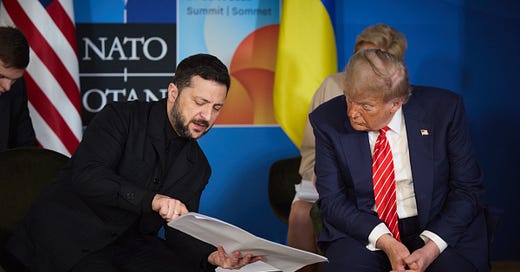Hello and welcome to your weekly Ukraine briefing, where I walk you through the main headlines of the week from Kyiv.
On Monday, the Deputy Prime Minister of Ukraine, Oleksii Chernyshov, became the highest-ranking official in the country’s history to face corruption charges while in office. Authorities accused Chernyshov of enriching himself on an illegal land grab deal with Kyiv’s developers several years ago when he was the Minister for Development of Communities and Territories. The whole thing is terrible, but what makes it even worse is that Chernyshov reportedly shares a good relationship with Ukraine’s President Volodymyr Zelensky. If Chernyshov miraculously escapes prosecution, which happens often with top Ukrainian officials, it surely won’t look good for Zelensky both at home and abroad.
When Ukrainian media reported that Chernyshov was about to become a suspect in a corruption case, the situation became unexpectedly comical. The Deputy PM suddenly extended his business trip in Europe, as if intending to avoid prosecution by not returning to Ukraine. The irony is that Chernyshov leads the Ministry of Unity, a newly created and, frankly, dubious institution tasked with facilitating the return of Ukrainians abroad back home. After days of speculation and memes, Chernyshov made it back to Ukraine, denying all charges.
In The Hague, members of the North Atlantic Treaty Organization gathered for an undoubtedly historic summit on Tuesday.
A sad reflection of the times, NATO’s main priority was making Donald Trump happy, which meant changing several of the summit’s core features. The formal part of the event was shortened so Trump doesn’t get bored. The final declaration, which usually spanned pages and pages of text, was cut down to five concise bullet points and mentioned both Ukraine and Russia only once. NATO’s General Secretary Mark Rutte apparently called Trump a daddy when discussing Israel and Iran. (Trump’s team is now eagerly selling Trump Daddy Shirts, while some inside MAGA debate if the whole thing is too gay for them). President Volodymyr Zelensky arrived to the event in suit-like attire for the first time in years, his photos sparking headlines like “The most important fashion news you’ll read today”. Like everyone else, Zelensky was eager to avoid any possible source of friction with Trump and his entourage.
For the first time since Russia’s full-scale invasion, the war in Ukraine didn’t dominate the agenda. Instead, the allies focused on their own defence spending. For months, Trump has demanded that the Europeans spend five percent of their Gross Domestic Product on defence, a sharp increase from the prior two percent benchmark. After some political maneuvering around Spain’s discontent, NATO allies agreed to spend 3,5% of their GDP on core defence requirements, like troops and weapons, and another 1,5% on strengthening military-related infrastructure and civic preparedness. The White House hailed the achievement “a monumental victory for the United States and its allies”, and it’s one of those rare instances when they may be right.
Despite some grim Western reporting about Ukraine being sidelined during the summit, the Ukrainian delegation didn’t leave empty-handed. The very fact that Zelensky made it to the summit is an achievement since there was reporting about Washington not wanting him there. Zelensky also had a one-on-one meeting with Trump, which reportedly lasted around 50 minutes. The leaders discussed a potential ceasefire, Zelensky said, and Ukraine’s readiness to buy equipment from the US.
Perhaps the most notable moment for Ukrainians was Trump’s exchange with a Ukrainian journalist Myroslava Petsa, who works for the BBC. When Petsa asked Trump about American plans to deliver more air defence capabilities to Ukraine, Trump asked her whether she lived in Ukraine. Petsa said she and the kids live in Warsaw, but her husband has been in the army since the beginning of the big war. Trump seemed to genuinely empathize with her family: "I wish you a lot of luck, I can see this is very upsetting to you and say hello to your husband. On the issue of Patriot intercepters, Trump said he was “going to see if we can make some available”. The video of the exchange went viral on Ukrainian social media.
Kyiv’s most important takeaway was in the summit declaration’s one mention of Ukraine: “Allies reaffirm their enduring sovereign commitments to provide support to Ukraine, whose security contributes to ours, and, to this end, will include direct contributions towards Ukraine’s defence…when calculating Allies’ defence spending.” This mechanism ties Ukraine to Europe’s long-term defence budgeting, potentially increasing the flow of military aid and money for Ukraine’s domestic weapons production. The declaration also said that Russia “posed a long-term threat…to Euro-Atlantic security”, and that NATO’s commitment to collective defense remains “ironclad”. In the era of Trump, these lines shouldn’t be taken for granted.
The week ended with Russia unleashing its largest-ever air attack against Ukraine, according to Ukraine’s Air Force, sending 537 drones and missiles on Saturday night. Cities all across the country, including Lviv in the west and Kherson in the south of Ukraine, were targeted. An F-16 pilot, Maksym Ustymenko, died when his jet was damaged after destroying seven Russian missiles during the attack. He was posthumously awarded the title Hero of Ukraine.
Other stories I’m following…
From the Kyiv Independent, Investigation: How Russia prepares its strategic missile plant for ‘eternal war’
From the New York Times, Russia Seizes Key Lithium Field in Challenge for U.S.-Ukraine Minerals Deal
From the Financial Times, How Wirecard’s Jan Marsalek went from fraudster to spy — a gripping podcast series about Russian espionage in Europe. 10/10.
Cheers,
— Yours Ukrainian




